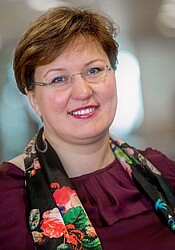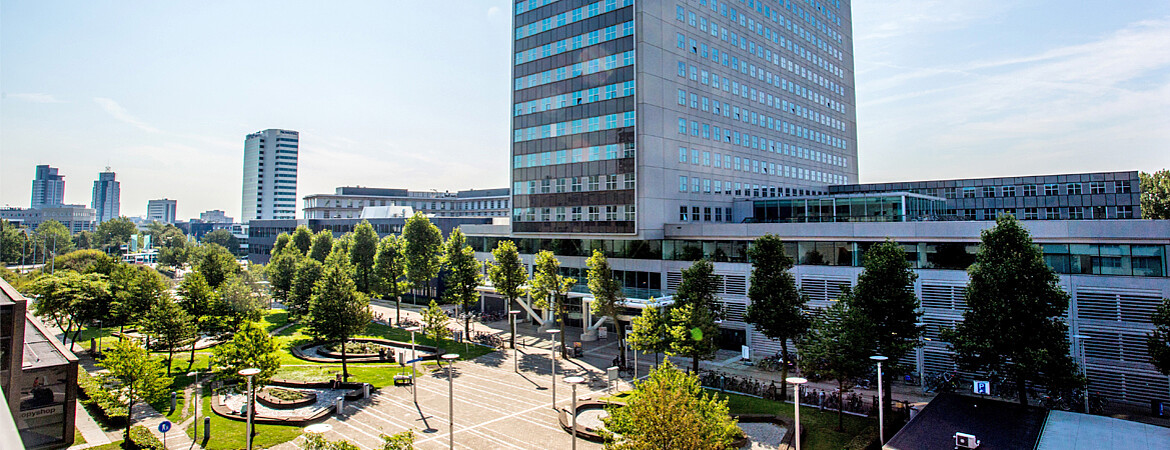Dr E. (Evgenia) Dolgova

My research applies dynamic social network analysis to study innovation. Zooming on the antecedents of innovation, I explore how individual and group characteristics affect the evolution of relationships in innovating teams, and how this dynamics affects important group outcomes such as team performance. This research steam contributes to innovation literature, emphasizing that individuals and their interactions matter for organizational performance.
Zooming out, I look on the consequences of innovation and investigate how emergent technologies impact traditional institutions. Applying complexity lens, dynamic analysis of social networks and semantic network analysis, I study how new technologies propagate through society, taking massive open online courses and nanotechnology as examples. I am interested in how motivation and actions of various stakeholders result in systemic change, and ultimately adoption - or rejection - of new technology. This research stream extends organizational theory by focusing on the interplay between new technologies and institutional arrangements.
To shed light on these phenomena, I apply a broad repertoire of methods, from stochastic actor-based modeling, to social network analysis, to natural language processing.
PhD Track On getting along and getting ahead: How personality contributes to social network dynamics
Although we realize the importance of the generation of fundamental and new technological knowledge (technological innovations), we think that an often neglected determinant of innovation is the managerial and organization capacity to recognize this knowledge, assimilate it, and apply it to commercial ends (Cohen and Levinthal, 1990; Van den Bosch et al. 2003). We define these managerial and organizational innovations as novel managerial capabilities and new organizing principles for using the existing knowledge-base to carry out combinations that are new to the firm and the industry. Managerial and organizational innovations are thus innovations that have a more significant impact on the relationships between the constituting technologies and knowledge components, than on the technologies themselves (Henderson and Clark, 1990). Many strategy scholars applying an evolutionary perspective (Grant, 1996; Kogut and Zander, 1992; Nelson and Winter, 1982) argue that these managerial innovations are limited to deploying and extending existing capabilities rather than constantly recreating new capabilities. However, firms such as Microsoft, Honda, and Benetton were able to continuously recreate new managerial capabilities and novel organizational forms in various competitive rounds resulting from their management's extensive absorptive capacity and learning ability. These managerial capabilities and organizing principles opened up new sources of innovations and productivity growth resulting in competitive advantage. There is great unanimity among strategy scholars that the need for these new managerial capabilities and organizing principles in hyper competitive environments is even greater than ever (Pettigrew et al., 2003). Expanding worldwide competition, fragmenting markets, and emerging technologies force established firms to renew themselves continuously by transforming stagnant businesses and creating new sources of wealth through new combinations of resources (Guth and Ginsburg, 1990) and new knowledge integration patterns (de Boer et al 1999). According to Porter (1996), downsizing, restructuring, reengineering, and benchmarking often only improve operational effectiveness, but do not provide strategic advantage. Likewise, Hamel and Prahalad (1994) contended that instead of `more of the same' or `try harder' approaches ("How to be better"), firms should fundamentally reconsider their core activities ("How to be different"). Not a static strategy, but strategy innovation and industry transformation are much more important (Volberda, 2003). The position of the Netherlands in the Global Competitiveness Index of the World Economic Forum regarding innovativeness and productivity growth is disappointing. The Dutch degraded from the top-10. This could have serious consequences for the international competitive advantage of firms and organizations in the Netherlands. At present, the primary focus of government and business in the Netherlands is on efficiency and exploitation instead of innovation and strategic renewal. Such a focus will not result in a fundamental improvement of our innovation capacity (March 1991; Van den Bosch and Volberda, 2003; Volberda and Van den Bosch, 2004). This raises important problems. This research project contributes to these problems by investigating as research question “How do managerial and organizational determinants of innovative organizations contribute to sustained competitive advantage of Dutch firms?
- Time frame
- 2007 - 2019
Publications
Article (3)
-
Professional (3)
-
Schootstra, E., Deichmann, D., & Dolgova, E. (2017). Can 10 minutes of meditation make you more creative? Harvard Business Review. https://hbr.org/2017/08/can-10-minutes-of-meditation-make-you-more-creative
-
Schootstra, E., Deichmann, D., & Dolgova, E. (2017). Can 10 minutes of meditation make you more creative? HBR OnPoint Magazine, Spring, 26-27.
-
Schootstra, E., Deichmann, D., & Dolgova, E. (2017). Can 10 minutes of meditation make you more creative? HBR OnPoint Magazine, Spring, 26-27.
-
Chapter (2)
-
Academic (2)
-
Mehra, A., Kang, D., & Dolgova, E. (2023). Friendship at work: Inside the black box of homophily. In Understanding Workplace Relationships: An Examination of the Antecedents and Outcomes (pp. 369-389). Springer International Publishing AG. https://doi.org/10.1007/978-3-031-16640-2_12
-
Schrempf, B., & Dolgova, E. (2015). Nano-technology in Ireland – an analysis of patent co-classification network. In D. G. Assimakopoulos, K. Pandza, & I. Oshri (Eds.), Managing Emergent Technologies for Socio-Economic Impact. Edward Elgar Publishing. https://doi.org/10.4337/9781782547884
-
Conference contribution (18)
-
Academic (18)
-
Dolgova, E., Heugens, P., Wolf, M., & Pandza, K. (2016). Hopes and Fears: Institutional logics and sentiment around MOOCs.. Annual Meeting of the International Network for Social Network Analysis (INSNA / Sunbelt Conference), Newport Beach, CA.
-
Dolgova, E., Heugens, P., Wolf, M., & Pandza, K. (2016). Hopes and Fears: Institutional logics and sentiment around MOOCs.. OMT Paper Development Workshop, Edinburgh, UK.
-
Dolgova, E., & Schippers, M. (2015). Co-evolution of perceptions of competence and friendship in teams: the effect of self-monitoring personality.. Annual Meeting of the International Network for Social Network Analysis (Sunbelt Conference), Brighton, UK.
-
Dolgova, E., & Pandza, K. (2014). The emergence of the field: Exploratory discourse analysis of Massive Open Online Courses (MOOCs).. Proceedings of the Academy of Management Annual Meeting, Philadelphia, USA.
-
Alexiou, A., Schippers, M., Oshri, I., & Dolgova, E. (2013). Exploring the real potential of serious games: The role of game features and individual differences on user engagement and learning.. EGOS Colloquium, Montreal, Canada.
-
Dolgova, E. (2013). The effect of self-monitoring personality, perceptions of competence on friendship formation in teams.. Academy of Management Annual Meeting, Lake Buena Vista, USA.
-
Dolgova, E. (2013). The emergence of the field: Exploratory discourse analysis of Massive Open Online Courses (MOOCs).. Management Research for European Innovation, Aalto University, Helsinki, Finland.
-
Dolgova, E. (2013). Exploratory Discourse Analysis of an Emergent Field - Massive Open Online Courses.. Annual Meeting of the International Network for Social Network Analysis (Sunbelt Conference), Hamburg, Germany.
-
Ben-Menahem, S., Dolgova, E., & Neerijnen, P. (2012). The Role of Team Members' Proactive Personality and Advice-Seeking Behavior in the Emergence of Team Proactive Behavior. Strategic Management Society Conference, Prague, Czech Republic.
-
Dolgova, E. (2012). Personality-trait based homophily. International Seminar “Personal Networks: Methods and Applications”, Barcelona, Spain.
-
Dolgova, E., & Schippers, M. (2012). The effect of self-monitoring personality and expertise on relationship formation in groups.. European Academy of Management Annual Meeting (EURAM), Rotterdam, the Netherlands.
-
Dolgova, E., & Schippers, M. (2012). Birds of a feather 2.0: Is there a personality-based homophily?. NYU Stern Medici Summer School 2012, Florence, Italy.
-
Dolgova, E., Ben-Menahem, S., Neerijnen, P., & van de Vrande, V. (2012). The Emergence of Team Proactiveness.. Annual Meeting of the International Network for Social Network Analysis (Sunbelt Conference), Redondo Beach, USA.
-
Dolgova, E. (2011). Birds of the Feather Flock Together 2.0: Is There a Personality Based Homophily?. Annual Meeting of the International Network for Social Network Analysis (Sunbelt 2011), St. Pete Beach, FL, USA.
-
Dolgova, E. (2011). Birds of the feather 2.0: Is there a personality-based homophily?. International Conference on Applications of Social Network Analysis (ASNA 2011), Zurich, Switzerland.
-
Dolgova, E., Van Olffen, W., van den Bosch, F., & Volberda, H. (2010). The Interaction between Personality, Social Network Position and Involvement in Innovation Process. Organization Science Winter Conference, Steamboat Springs, Colorado, USA. http://hdl.handle.net/1765/26295
-
Dolgova, E., Van Olffen, W., van den Bosch, F., & Volberda, H. (2009). The Effects of Personality and Social Network Position on Individuals' Involvement in Innovation. INGroup Conference, Colorado.
-
Dolgova, E., Van Olffen, W., van den Bosch, F., & Volberda, H. (2009). The Interaction Between Personality, Social Network Position and Involvement in the Innovation Process. 9th EURAM Conference 2009, Liverpool.
-
Doctoral Thesis (1)
-
Internal (1)
-
Dolgova, E. (2019). On Getting Along and Getting Ahead: How Personality Affects Social Network Dynamics. [Doctoral Thesis, Erasmus University Rotterdam]. Erasmus Universiteit Rotterdam (EUR).
-
Research case (1)
-
Academic (1)
-
Dolgova, J., (2013). The case of Siemens TechnoWeb: Using online social network as a tool to foster organizational learning.
-
Additional activities (1)
-
Academy of Managment Annual Meeting
Attending an event (Academic)





